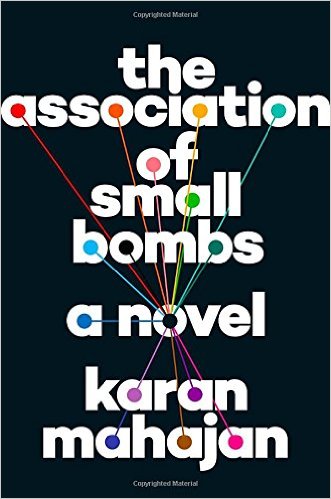【Hairy | Adult Movies Online】
Staff Picks: Blackass,Hairy | Adult Movies Online Academic Robes, Floppy Disks
This Week’s Reading

Photo: Anil Dash
There’s a scene in The Producers in which Max Bialystock finds Kafka’s Metamorphosis as a script and rejects after reading the first line; “It’s too good,” he complains. I thought of this as I began reading A. Igoni Barrett’s novel Blackass, which takes Gregor Samsa’s experience as its starting point: Furo Wariboko wakes to discover that he has metamorphosed from a black Nigerian to a white Nigerian, which is a sort of person who doesn’t really exist. It’s hard to improve on Kafka’s original, but, luckily, that isn’t Barrett’s aim. Furo’s transformation into an impossible creature puts him in a unique position: he is white, and so has a natural power over his black countrymen, and he can speak Nigerian pidgin, which gives him influence with that same group; he is feared and respected. In Furo’s navigation from one of Lagos’s many struggling unemployed young people to a man of privilege and agency, Barrett deftly transmutes him from metaphor into full-fledged character. Barrett also employs a handful of secondary characters who metamorphose in other, less spectacular ways that are likewise tied to issues of race, gender, money, and status. (I thought, too, of Charles Johnson’s Middle Passage, another novel that mixes reality and the fantastical to great effect.) The freedom that reinvention engenders proves intoxicating. As one character marvels, “I was whoever I wanted me to be.” —Nicole Rudick
I trust you weren’t expecting me to discuss anyone or anything other than Prince this week. I’d like to share three of the many remembrances that have moved me to tears. First is the story of a floppy disk that Prince distributed to the press in 1993, when he’d changed his name to the unpronounceable Love Symbol: the disk contained a font allowing journalists to type the glyph in place of his name. (“It just seemed like a logical thing to do,” his graphic designer said.) Second is an interview with his personal chef, Ray Roberts, who reveals Prince’s favorite desserts; while Ray was cooking, he often overheard Prince in diligent rehearsal. (“The kitchen was adjacent to the sound studio, so the biggest treat of all for Ray was hearing the music, every day, loud and clear in the kitchen … He says Prince would regularly play three seconds of a song, dozens of times in a row, to get it right.”) And the third is D’Angelo’s performance of “Sometimes It Snows in April” from the Tonight Show this week, which reduced me to a puddle. Sometimes I feel so bad, so bad … —Dan Piepenbring

As a teenager I sometimes dreamed of running off to join Robertson Davies, the Canadian novelist and scholar, in his magical Massey College, where they told ghost stories every Christmas and wore academic robes to class. Unfortunately for me, Massey College turned out to be a graduate school, but last week I spent a few nights in the magical precincts of Davies’s 1970 novel Fifth Business. This story of a Davies type—a small-town boy, the son of a newspaper editor, who becomes an aficionado of obscure Catholic saints, and of conjuring—is preposterous, acerbic, genial, and dazzling, like its author. —Lorin Stein
Vita Activa: The Spirit of Hannah Arendt, a documentary by Ada Ushpiz, is currently showing at New York’s Film Forum. An entertaining look at the controversial German-Jewish philosopher’s life and, particularly, her thought, Vita Activa mines a rich trove of primary sources, as well as Arendt’s body of written work. But the film itself, appropriately enough, is generating a different kind of controversy: in a Medium.com article, the Hannah Arendt Center director Roger Berkowitz takes the filmmaker to task for what he terms “the cynicism of paraphrasing” (a play on Arendt’s famous—and oft-misinterpreted—banality of evil.) In shortening and smoothing some of Arendt’s quotes, writes Berkowitz, Ushpiz flies directly in the face of her subject’s ethos: “the ease and deceptiveness with which Ushpiz has chosen to alter the factual reality of Arendt’s words is a direct refutation of Arendt’s insistence on the need to deal with a complicated and messy reality, whatever it may be.” —Sadie Stein
The Allegheny Front, sometimes called the Eastern Continental Divide, is the easternmost ridge of the Allegheny Mountains, and on a good relief map it looks like a night crawler wriggling its way around the eastern seaboard. Matthew Neill Null’s new story collection, Allegheny Front, is set there, and in a way it hews to geologic time. His characters span centuries: from a murdered traveling salesman to a haunted modern-day white-water-rapids guide to young scientists whose equipment is stolen and ruined by locals, every story in the collection gives way to entropy. Some of the stories read like historical fiction in the Faulknerian mode, surrounded by a universal nostalgia without sentimentality. Allegheny Frontis about the history of a specific place, one that adds up to more than simple Civil War stories, pioneer lore, and weekend camping tales, it’s about the cold passage of eons that might trivialize his character’s stories, were those stories in other hands—these brief flashes of struggle and disappointment are the reasons we consider time at all. —Jeffery Gleaves

Karan Mahajan’s The Association of Small Bombs has a wide blast radius: the narrator remarks on page one, “A good bombing begins everywhere at once.” But Mahajan’s story begins more narrowly, with a terrorist attack in a small New Delhi market that takes the lives of two young boys. The lives of Vikas and Deepa Khurana as they grieve the deaths of their sons, and of Shockie (the bomb maker) as he grapples with his loyalty to the terrorists behind the attacks, read like errant vectors shooting off in all directions from the central event they share. Even singular moments—as when Vikas gets an erection from the smell of pastry in his wife’s hair—feel like tiny explosives. Bombs is full of tangents, but it’s so cohesive that I struggle to talk about it without resorting to the language of, you know, bombs. Everything is connected, as Vikas notes at his most forlorn, because “people are defined much more by their association with death than by what they do in life.” —Daniel Johnson
Search
Categories
Latest Posts
It's Aaron Rodgers' NFL and everyone else is just playing in it
2025-06-26 13:09Tristan Trump stole the show from his grandpa on Inauguration Day
2025-06-26 12:25Get Rid of Windows 10 Ads, Office Offers and Other Annoyances
2025-06-26 11:34Popular Posts
Today's Hurdle hints and answers for April 29, 2025
2025-06-26 12:58It's Aaron Rodgers' NFL and everyone else is just playing in it
2025-06-26 12:26Obama's photographer just shared a very poignant farewell photo
2025-06-26 11:38Best Sony headphones deal: Over $100 off Sony XM5 headphones
2025-06-26 11:34Featured Posts
Best Max streaming deal: Save 20% on annual subscriptions
2025-06-26 13:16Newborn baby becomes ideal wingman in father's surprise proposal
2025-06-26 12:18Marchers protesting Donald Trump carry Princess Leia signs
2025-06-26 12:17Today's Hurdle hints and answers for April 23, 2025
2025-06-26 11:41Popular Articles
Commissioning Misleading Core i9
2025-06-26 13:35Two teens freaked out the internet by 'eating' ramen from a toilet
2025-06-26 13:30Apps aren't dead — they're thriving to the tune of $89 billion
2025-06-26 13:01Hillary Clinton tweets in support of Women's March on Washington
2025-06-26 12:17How to Reboot and Reset Android Devices
2025-06-26 12:10Newsletter
Subscribe to our newsletter for the latest updates.
Comments (4927)
Co-creation Information Network
The Anatomy of Liberal Melancholy
2025-06-26 13:44Follow Information Network
Malia Obama snags movie studio internship for next move
2025-06-26 13:42Unimpeded Information Network
This is President Trump's first tweet as @POTUS
2025-06-26 12:53Vigorous Information Network
Sad! Trump reportedly forced to give up the phone he tweets with
2025-06-26 11:58Star Sky Information Network
Ireland fines TikTok $600 million for sharing user data with China
2025-06-26 11:13